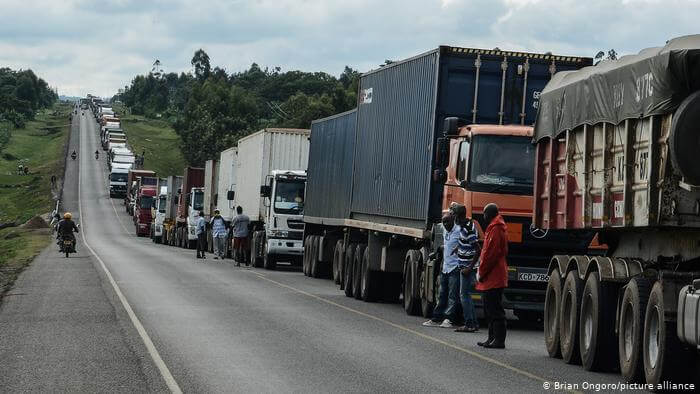
Our Projects are
Transforming African Trade
Quick Contacts
2nd Floor, Fidelity Insurance Centre Waiyaki Way, Westlands

For many African long-distance drivers, 2021 began in a traffic jam. In southern Africa in particular, border traffic is only possible under difficult conditions: on 12 January, South Africa’s President Cyril Ramaphosa tightened entry restrictions. Initially, only important goods such as food, gasoline or medical equipment are allowed to cross the strictly guarded borders for months until mid-February.
Long queues of trucks are therefore formed, especially on the Zimbabwean and Mozambican sides. At the Beitbridge border crossing in Zimbabwe, drivers have to wait up to four days to enter South Africa. The daily losses to the economy are immense.
The small border traffic of traders and day laborers has also become more difficult. If you don’t have a permanent visa for South Africa, you won’t be able to get into the country easily. In addition, all those wishing to enter must have negative Corona tests.
“Many Mozambicans have casual jobs in South Africa, others regularly buy products in South Africa as traders that they sell in Mozambique. These people are suffering greatly from the current situation,” says Mozambican journalist Milton Maluleque. A few days ago, he took stock of the Lebombo border crossing between South Africa and Mozambique.
“Long queues form every day at the border,” Maluleque told DW. Few trucks would pass through, most small dealers and workers turned away. Many Mozambicans are therefore trying to cross the green border into South Africa illegally, which is not always the result. Between 300 and 400 cross-border commuters are detained and sent back daily in the border area between South Africa and Mozambique alone, Maluleque said.
“We are concerned about the many border violations, including at the green border, in places that are not considered official border crossings,” said Tommy Makhode, head of the South African border crossing in Lebombo.
Many poor Mozambicans endure for days in the border area. ‘I’ve tried to cross the green border twice and I’ve been arrested every time, but I’m not going to give up. I’m certainly not going to put my hands in my lap and starve,” a Mozambican trader told DW. A young woman with a baby in her arm adds: “I have a passport, but they don’t let me in. I depend on the income to pay for food and school fees for my children. Since South Africa does not give me an entry visa, I have no choice but to enter illegally.”
The Member States of the East African Community are also demanding negative corona tests at the borders. This leads to long traffic jams, for example at the crossings between Kenya and Uganda. This results in delivery bottlenecks and financial losses for dealers,transport companies and customers.
“COVID hat meine Arbeit viel schwieriger gemacht”, sagt etwa Fernfahrer Joseph Kimunda. Fünf Mal im Monat transportiert er Waren zwischen Kenia und Uganda. “Wenn ich nach langer Wartezeit über die Grenze nach Uganda komme, darf ich nicht mal parken, um Wasser zu kaufen. Sie verjagen mich und sagen ‘Du hast Corona, geh weg!”’ Das sei aber nicht mal sein größtes Problem. Um die Grenze zu überqueren, habe er einmal 10 Tage auf sein obligatorisches Corona-Testergebnis warten müssen, erzählt er der DW.
Dank einer neuen App sollen Wartezeiten und Schikanen für die Fernfahrer bald der Vergangenheit angehören. “Die App vermeidet Verspätungen, die durch die ausstehenden Testergebnisse verursacht wurden”, sagt Shannon Tumba, Mitarbeiterin des Projekts “Cargo Driver Tracking System” aus Kenia, das die neue App entwickelt hat.
Die Fahrer müssen sich nicht mehr an der Grenze testen lassen und dort auf die Ergebnisse warten. Sie können sich auch anderswo testen lassen und bekommen das Ergebnis direkt aufs Smartphone. Diese Zertifikate werden nicht nur von Kenia, sondern auch von Uganda, Tansania und Ruanda anerkannt. An der Grenze müssen die Fernfahrer nur die QR-Codes ihrer Zertifikate vorzeigen und dürfen passieren: „Der Vorteil ist, dass die Gesundheitsbehörden nur mein Handy-Display screenen müssen und sofort das Ergebnis sehen. Wenn es rot ist, bist Du positiv, dann kommst Du in Quarantäne. Wenn es blau ist, kannst Du weiterfahren”, so Joseph Kimunda. Dass seine persönlichen Daten weitergegeben und verarbeitet werden, stört ihn nicht.
Each of his steps is closely followed. Its position and data end up in the command center of the project in Nairobi, which is led by Trade Mark East Africa. The non-profit organization works closely with the East African community, governments and the private sector. More than 50,000 drivers Kenya, Uganda, Rwanda and Tanzania have registered so far, according to Trade Mark. Burundi, the Democratic Republic of Congo and South Sudan are expected to follow soon.
DW correspondents from other regions of Africa are also increasingly reporting on tighter border controls, restricted freedom of travel and problems with the transport of goods. For example, border traffic on the border between Senegal and Guinea-Bissau is severely restricted because of measures to contain the Corona pandemic.
Travel, freedom of establishment and free trade across borders – a long-cherished dream in Africa. With two ambitious projects, the African Union wants to advance political integration on the continent: a free trade areacovering the entire continent and a common passport. It should apply to all 54 countries on the continent and make visas unnecessary. But this plan is currently experiencing a huge setback, as in Europe.
“The dream of freedom of travel and unrestricted movement of goods throughout Africa has not yet been dreamed up,” says Milton Maluleque, a Mozambican journalist from South Africa. It was only currently postponed because of the pandemic and other safety factors.
Read original article
Disclaimer: The views and opinions expressed in this article are those of the authors and do not necessarily reflect the official policy or position of TradeMark Africa.